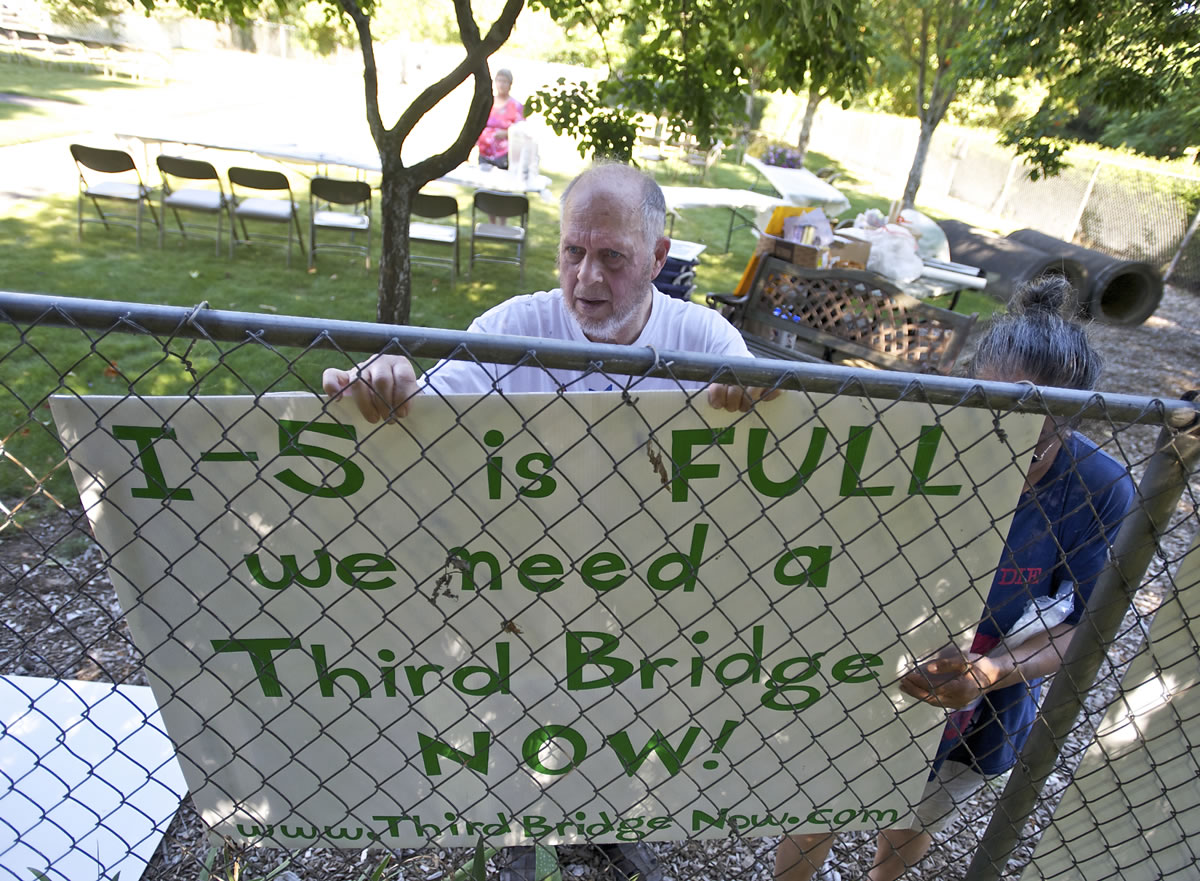Ethics panel to investigate I-5 bridge adviser
Jim Howell wasn’t entirely surprised when the Columbia River Crossing project imploded last month. Actually, Howell insists he’s seen it coming for some time.
“I wish I had a big sign saying, ‘I told you so,'” he said.
Howell, a retired architect and former TriMet employee, is one of the minds behind the “Common Sense Alternative” — a plan backers say is a more practical, less costly transportation solution than the $3.4 billion CRC. The now-defunct project would have replaced the existing Interstate 5 Bridge, extended light rail into Vancouver and rebuilt freeway interchanges on both sides of the Columbia River.
The Washington and Oregon governors pulled the plug after Washington lawmakers adjourned last month without committing any funding to the project. Its demise put new wind in the sails of Howell and others who have floated their own ideas on transportation improvements for years.
But any proposal faces a harsh reality: It must get both states’ leaders on board to go anywhere. It took years to get the CRC off the ground, only to rack up more than $170 million in planning costs without a shovel being turned. A future project that rises from the CRC’s wreckage will face many of the same political hurdles as the failed megaproject. In addition, it will have to overcome the sour taste left by the CRC’s collapse.
“We’re not going to be the ones deciding,” said Brad Perkins, whose firm Perkins Niederer and Associates has developed a multimodal proposal that includes high-speed rail through the Portland-Vancouver area. “We’re just out here trying to create alternatives.”
Howell and Perkins were among the attendees of an outdoor gathering in Vancouver last week intended to offer alternatives to the CRC. Organizer Sharon Nasset, of the nonprofit Economic Transportation Alliance/Third Bridge Now, said the event was planned before news of the CRC’s death became official.
Ideas included a third bridge over the Columbia River, either east of Interstate 205 or west of Interstate 5 — an alignment Nasset’s group favors. Perkins’ proposal would build a multimodal “Cascadia Bridge” to accommodate high-speed rail, transit, freight and motor vehicles on a new span connecting Portland and Vancouver as part of a larger rail corridor.
Ideas resurrected
The Common Sense Alternative pushed by Howell and others has taken on various forms over the years. The most recent version would build a new Interstate 5 lift bridge, but leave the existing spans to be repurposed for local traffic, transit, bikes and pedestrians. It would also include smaller fixes near the corridor. Howell said he believes the whole thing could be done for less than $1 billion.
Discussions in the early stages of the CRC included many of the concepts now being pursued as alternatives: additional crossings, a local connection between Vancouver and Portland, reversible lanes, even a tunnel. A 39-member task force ultimately recommended the large replacement bridge with light rail local leaders endorsed in 2008.
The choice triggered some opposition on both sides of the river, but for different reasons. It also revealed the political minefield any new proposal would have to navigate to find common ground. The dynamic was summed up well by Metro Council President Tom Hughes during a meeting on the subject in 2011:
“What the Vancouver folks have said to me clearly … is no bridge, no light rail,” said Hughes, who leads the Portland-area regional government. “What we’ve said to them is no light rail, no bridge. So we have both.”
Instead, the two cities ended up with neither.
Before choosing a path forward, the Portland-Vancouver area would benefit from a comprehensive discussion with a long-term focus, said bridge architect Kevin Peterson of Friday Harbor, who floated his own collector-distributor design during the CRC process. It would be folly to jump to a new plan without fully considering its consequences, he said.
First, the area will have to overcome a rift left by the acrimonious debate over the CRC.
“It’s a community in fracture right now,” Peterson said. “You’ve created a couple of encampments that are not candidates for rational discourse.”
The Portland-Vancouver metro area will likely need one or more additional crossings over the Columbia River in the future, Peterson said. But new plans can’t reflect the car-centric mind-set that has defined the past, he said.
Howell said he “absolutely” sees opportunity in the demise of the CRC. Perkins believes ears are beginning to open to alternatives as the region ponders its next steps.
Vancouver resident Stephanie Turlay, among the CRC opponents who attended last week’s gathering, expressed at least one sentiment likely shared by many: Citizens don’t have the appetite for another project that spends tens of millions of dollars with no results, she said.
“Whoever does this,” Turlay said, “had better have their act together and better do it right.”
Eric Florip: 360-735-4541; http://twitter.com/col_enviro; eric.florip@columbian.com




